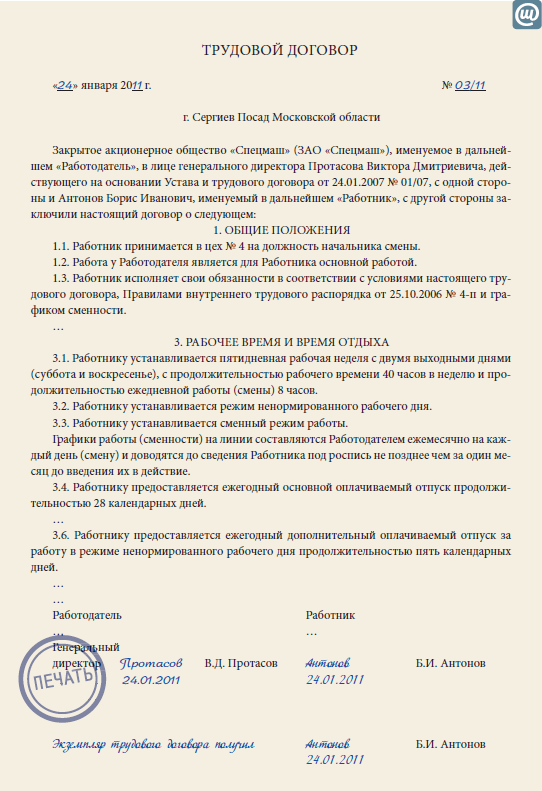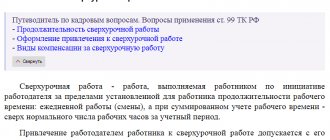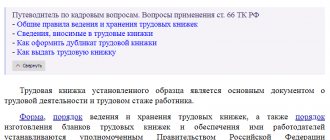How to properly set an irregular working day schedule
Let us say right away that the Labor Code does not limit the choice of the employer: it has the right to determine the categories of employees who can be assigned such a work regime.
The main condition is to develop and approve a list of employee positions. It is included in the collective agreement, agreement or any local regulation of the employer. Such a list may include employee positions:
- the duration of work of which cannot be accurately calculated (company managers, business personnel and technical service workers);
- planning to complete assigned tasks at their own discretion;
- whose working day is divided into intervals of unspecified duration.
You should not include absolutely all positions on the staffing table in the list - controllers will consider this irrational.
Let's give an example of what such a list might look like.
Question: Is it possible to establish an irregular working day for a person performing work on a part-time basis?
Yes, you can. There is no corresponding ban, and Rostrud has spoken out on this issue more than once, pointing out this possibility (see, for example, Letter dated April 19, 2010 No. 1073-6-1).
The Labor Code does not define the categories of employees who may be assigned irregular working hours in 2021; recent news does not promise changes. The company determines the list of positions independently and records it in a special internal document. But there are some restrictions. Such a regime cannot be established for employees with maximum working hours in accordance with Art. 94 Labor Code of the Russian Federation. These include:
- employees aged 15-18 years;
- workers 14-18 years old who combine work and study;
- disabled people with a reduced time limit according to a medical report;
- employees employed in hazardous industries.
And also with reduced working hours in accordance with Article 92 of the Labor Code. This number includes:
- employees under 18 years of age;
- disabled people of group 1 or 2;
- working in harmful or dangerous working conditions (grades 3 and 4).
In the case of a part-time working day, irregularity can be established only in case of an incomplete week, but with a full working day.
First of all, the organization’s local regulations must establish a list of positions with irregular working hours and compensation procedures. Such a document is drawn up in free form, possibly on the organization’s letterhead. In addition to the list of positions, you must indicate the full name of the institution and its legal form.
Attention
Thus, the legislator does not recognize overtime during irregular hours as overtime work, which must be compensated by additional pay and has hourly restrictions. At the same time, employees whose working hours are irregular are subject to internal labor regulations regarding the beginning and end of the working day, providing them with weekly days off and rest on holidays.
This means that it is possible to involve an employee in additional work on weekends and holidays only in compliance with the provisions of Art. 113 and Art. 153 Labor Code of the Russian Federation. Night work is also a deviation from the norm, therefore it must be properly documented and paid at an increased rate established by local regulations or a collective agreement (Art.
154 Labor Code of the Russian Federation).
After this, an employment contract is concluded with the employee, which includes a condition for working on irregular working hours. By signing it, the employee agrees with the nature of the work, which involves overtime.
The wording of the entry could, for example, be as follows: “Work on irregular working hours.” If you need to establish an irregular working day during work, you must:
- familiarize the employee with the list of positions with irregular working hours, as well as the type and amount of compensation for work in this mode (in the event that the employee was not familiar with the specified documents for signature upon hiring or if changes were made to them, with which familiarization was not carried out (paragraph
10, part 2, article 22 of the Labor Code of the Russian Federation));
- enter into an additional agreement to change certain terms of the employment contract. The agreement must indicate the establishment of a special working regime, as well as reflect the duration of additional paid leave.
The concept of an irregular working day According to Article 97 of the Labor Code of the Russian Federation, the employer has the right sometimes (if necessary) to involve an employee in work outside the duration of his working hours only in two cases: for overtime work (Article 99 of the Labor Code of the Russian Federation) and if he is assigned an irregular working day (Article 101 of the Labor Code of the Russian Federation).
Since the legislation does not define the criteria for episodic involvement in work within an irregular day and the maximum number of overtime hours, in practice disputes very often arise between the employee and the employer. Let's try to figure it out. Based on the concept given by the Labor Code, the involvement of an employee who is assigned an irregular day to work outside the shift should not be a system, but be of an episodic nature.
Work accounting
Irregular working hours are sometimes mistakenly confused with overtime work, however, at the legal level these concepts have little in common.
| Overtime work | Irregular working hours |
| In a year, no more than 120 hours of processing are possible, and in 2 days without a break - no more than 4 hours | There are no restrictions on working hours, but the involvement of additional labor cannot become regular, systematic |
| Requires employee consent in each case | The employee gives his consent once by signing an employment contract |
| Processing is paid additionally at a separate rate | As compensation - additional paid leave |
The permissible number of overtime hours during irregular working hours has not been established; however, there are other restrictions regarding the systematic nature of extracurricular activities. An employee has the right to file a complaint with the prosecutor's office if overtime has become permanent.
Irregular working hours mean that only in some situations, occasionally, an employee is forced to stay late or arrive earlier than his colleagues. This does not give him permission to violate labor discipline, be late, or leave work early. Irregular work does not at all imply a flexible schedule.
On weekdays, the manager has the opportunity to call an employee with irregular working hours to work with only one verbal notification. But on weekends and holidays, extracurricular work will require a written order, voluntary consent of the employee, as well as separate payment.
Another limitation concerns the type of activity. It is prohibited to involve a subordinate in performing additional functions under the pretext of irregular working hours. Outside the main schedule, he can only perform his own job duties.
The legislation does not oblige entrepreneurs to keep records of additional time worked in positions with irregular working conditions. Moreover, overtime is not paid, which means it cannot be included in the main time sheet.
On the one hand, this simplifies the “paper” work in the company, but experts still recommend recording overtime hours in a separate journal. This will allow you to control the frequency and systematicity of employee involvement in work.
To be involved in additional work within the framework of irregular working hours, the position of this employee must be included in the list of positions with irregular working hours. This list of positions is fixed by local regulations. As a rule, an appendix to the PTR. Also, the condition on irregular working hours must be specified in the employment contract with the employee or in an additional agreement.
We suggest you read: How to write a clarification to the tax office

Any employees can be hired to work overtime, except those who cannot be hired due to the fact that they belong to the preferential category of workers (pregnant women, minors, studying at the organization under an apprenticeship contract). There are also categories that can be involved in overtime work only if they do not have health problems. These are disabled people and women with children under 3 years of age. At the same time, they must be aware of their right to refuse to work overtime.
With irregular working hours, the employee after working hours can only perform the same work that is specified in his employment contract. While overtime activities, in addition to the main function, may be due to the need to prevent accidents and other emergencies, waiting for a replacement, etc.
In case of irregular working hours, the employer can keep records of the employee’s working hours in order to avoid disputes and questions. The need for him to periodically go outside the main schedule is compensated for in another way. According to Article 119 of the Labor Code of the Russian Federation, he has at least three calendar days of paid leave.
The employer may establish by local regulations more time for vacation for irregular working hours. It is characteristic that the employee has the right to them after a year of work, completely regardless of whether he was involved in additional work in the current year or not. These vacation days can be added to the main vacation, taken off separately, or even compensated to the employee with money based on his application.
The situation is different with overtime pay. An employee is involved in it on the basis of a written order; this time is also clearly recorded in the time sheet, since:
- it is necessary to ensure that the employee is not involved in overtime for more than 120 hours per year and more than 4 hours in two days;
- You must pay for these hours at an increased rate. According to Article 152 of the Labor Code, the first two hours are at least one and a half times, the subsequent hours are double. This compensation is the minimum guaranteed to the employee. But the employer can also increase the amount of this compensation by defining it in its local regulations.
The situation is different with the documentation of involvement in overtime activities.
As a rule, the need for overtime activities arises suddenly, and there is not much time left to prepare documents. Therefore, if the employee does not belong to a special category, and the need to leave is related to emergency situations, then it will be enough to issue an order to attract additional work and familiarize the employee with it. In this case, his refusal to withdraw may be accompanied by an administrative penalty.
If the need to leave outside the schedule is not of an emergency nature, then consent to leave must be obtained from the employee. This can be done both on the order itself and on the notice of involvement in overtime work, which can be issued in advance (see Notice of involvement in overtime work and order).
In the timesheet, overtime is indicated by the letter “C” and the number 04. Payment for it is made as follows: for the first two hours - at one and a half times, for subsequent hours - at double. This is the minimum compensation established by the Labor Code.
The concept “occasionally”, used to determine the frequency of involvement in additional work during irregular working hours, is not disclosed in the current legislation. Therefore, it is worth proceeding from the etymology of this word, which means a separate incident, random event or circumstance.
But can there be overtime work during irregular working hours? First of all, it is worth noting that if an employee, whose employment contract stipulates irregular working hours, is called to work on his day off, then such work is paid to him, according to the law, in an increased amount, regardless of his normal working day or unstandardized.
If you are involved in an additional function on a working day beyond the schedule, you must remember the main criteria for an irregular working day: occasional involvement and additional work within the framework of your work function. Thus, we can conclude that involvement in additional work within another function, as well as involvement of a regular nature, requires increased payment in order to avoid disputes with inspection bodies and the employee himself.
In irregular working hours, an employee is involved in work periodically by order of the employer. However, in Art. 101 of the Labor Code of the Russian Federation does not say how such an order should be drawn up. Based on this, we can say that the legislator also allows oral form. At the same time, we believe that oral instructions should only be used if the company has clearly established time tracking.

There are two positions regarding the fixation of overtime during irregular working hours.
Some experts believe that this is simply necessary, since according to Part 4 of Art. 91 of the Labor Code of the Russian Federation, each employer must keep accurate records of the working time worked by each employee. For this purpose, a work time sheet of the unified form T-12 or T-13 is most often used. Using magazines is also not prohibited.
The maximum duration of an irregular working day is not fixed in the Labor Code of the Russian Federation. But this does not mean that an employee can work around the clock and seven days a week.
If an employee is late after work, then most likely the employee entering information into the time sheet will go home earlier, and accordingly there will be no one to record the number of overtime hours. In such cases, it is advisable to issue a written order. In addition, you can stipulate in the job description or employment contract, for example, that an employee stays at work for two hours twice a month to prepare a report.
Important
In order to transfer an employee to an irregular day according to all legal rules, you must first approve a list of positions that, for objective reasons, fall under such a schedule, then make changes to the internal acts of the organization and, finally, add a clause to the employment contracts. The following points must be included in the employment contract:
- Standard working and weekend hours;
- Time frame for one work shift;
- Number of breaks;
- A link to an order or other document containing a list of positions and the rationale for this decision;
- The procedure for involving a subordinate in activities outside the main working hours;
- Duration of additional leave, procedure for its provision.
Correct execution of the employment contract is a guarantee that in the future the manager will not need to obtain consent from the subordinate for every extracurricular activity.
Registration of attraction to work beyond normal working hours
In irregular working hours, an employee is involved in work periodically by order of the employer. However, in Art. 101 of the Labor Code of the Russian Federation does not say how such an order should be drawn up. Based on this, we can say that the legislator also allows oral form. At the same time, we believe that oral instructions should only be used if the company has clearly established time tracking.
There are two positions regarding the fixation of overtime during irregular working hours.
Some experts believe that this is simply necessary, since according to Part 4 of Art. 91 of the Labor Code of the Russian Federation, each employer must keep accurate records of the working time worked by each employee. For this purpose, a work time sheet of the unified form T-12 or T-13 is most often used. Using magazines is also not prohibited.
If an employee is late after work, then most likely the employee entering information into the time sheet will go home earlier, and accordingly there will be no one to record the number of overtime hours. In such cases, it is advisable to issue a written order. In addition, you can stipulate in the job description or employment contract, for example, that an employee stays at work for two hours twice a month to prepare a report. But there is no need to establish a condition that you need to stay late every day or every other day. Otherwise, when an employee applies to the State Labor Inspectorate, inspectors recognize such periodic involvement in work outside working hours as a violation of labor legislation.
Other experts believe that indicating overtime on the timesheet leads to the possibility of confusing irregular working hours with overtime work, and if the accountant considers the mark on the timesheet to be information about overtime, he will pay for it.
We adhere to the first point of view, since no one has canceled the time sheet. And recording the time spent at work will help the employer track the frequency of going beyond the working day. In addition, time tracking will be useful in the event of any emergency - it will be possible to say for sure whether the employee was at work or not.
We recommend that you indicate the standard working hours of an employee with irregular working hours in the time sheet. And records of processing can be kept in a separate journal.
Order on approval of the list of positions

Despite the fact that the Labor Code does not contain a direct prohibition on hiring pregnant women for work with irregular hours, it is still not recommended to attract this category of workers, since the appointment of pregnant women to positions with irregular working hours is contrary to Article 93 of the Labor Code of the Russian Federation. She says that a woman has the right to a shorter working day.
Employment contract
Drawing up an employment contract is mandatory when applying for a job. When applying a regime of irregular working hours, an indication of it must be present in the agreement between the parties. By signing such an agreement, the employee agrees to the establishment of a special working day. It is also necessary to familiarize the new employee with all local regulations.

Sample employment contract

This condition must also be indicated in the employment order.
Order for employment with irregular working hours

It is worth remembering that any employee, be it a worker or a director, can be involved in additional work only to fulfill their job duties. The performance of other types of activities must be formalized as a separate agreement.
Sample order

It is worth noting that if an employment contract has been concluded with an employee for a position that is not in the approved list of professions with irregular working hours, then this condition is unlawful. Consequently, the employee has the right to refuse to work beyond the working hours and on this basis he cannot be brought to disciplinary liability.
Free legal consultation We will answer your question in 5 minutes!
Call: 8 800 511-39-66
If an employee is transferred to a position for which irregular working hours are established, then the employer should:
Free legal consultation
We will answer your question in 5 minutes!
Ask a Question
- familiarize him with local regulations containing a list of positions with irregular working hours;
- conclude an additional agreement to the employment contract to include conditions for irregular working hours and compensation for this type of work;
- issue an appropriate order (in free form).
If the employee’s condition on irregular working hours is excluded, then the employer must enter into an additional agreement with him, which will contain a different work schedule, and issue a corresponding order.
Benefits for irregularity
A person with such a work schedule is subject to the enterprise regime. That is, he cannot come and go whenever he wants. The start and end times of the working day for such an employee are the same as for everyone else. But sometimes, by order of the employer, he can be involved in additional work both before the official start of the working day and after its end.
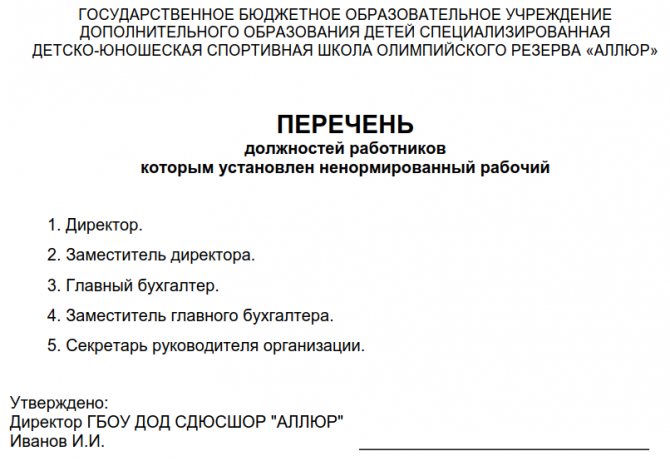
Work beyond the norm is not paid additionally, but is compensated by providing additional days of vacation (at the request of the employee). The minimum number of days is three (Article 119 of the Labor Code of the Russian Federation). An enterprise can establish a larger number of days of additional leave, enshrining this in local regulations.
At the request of the employee, additional leave can be replaced by monetary compensation (Article 126 of the Labor Code of the Russian Federation). To do this, you need to make a written application.
We suggest you read: Is it possible to provide leave to an employee on weekends and how to arrange it?
Compensation for working irregular hours.
The amount of vacation pay is determined by the formula:
- Sum up your earnings for the previous 12 months of work. Only wages are taken into account, and other benefits (sick leave, vacation pay) are excluded.
- Calculate the number of days worked during the period. A fully worked month is equivalent to an average of 29.3 days. If the employee was incapacitated for several days, you can use the formula to calculate: (Number of days in a calendar month - Days not taken into account) * 29.3 / Number of calendar days of the month. Sum values for 12 months.
- Calculate the average daily earnings by dividing the total earnings (point 1) by the number of days (point 2).
- The amount of vacation pay (vacation compensation) will be equal to the product of the average daily earnings and the number of vacation days.
Since information about an irregular schedule is significant and must be included in the employment contract, the employer must familiarize the future employee with this condition, as well as the compensation that he is entitled to for overtime working hours. In particular, according to Article 119 of the Labor Code of the Russian Federation, employees who work in this mode are entitled to additional paid leave. Its duration is determined by the collective agreement, but it cannot be less than three days.
An employee has the right to contact the employer with a request to replace additional leave for overtime with monetary compensation. This possibility is provided for in Article 126 of the Labor Code of the Russian Federation. However, providing this cash payment is the employer's right, not an obligation.
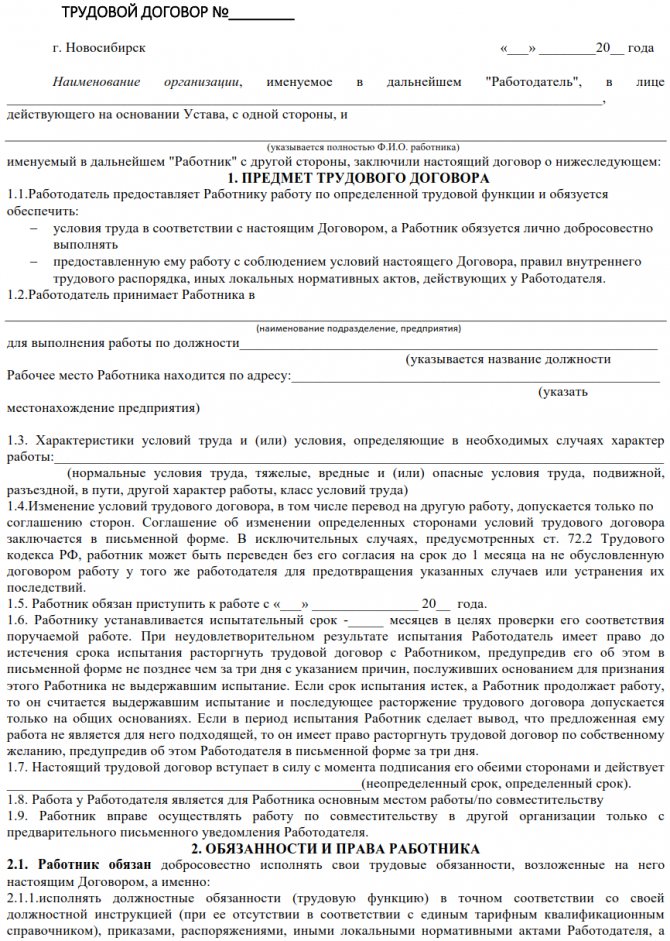
Article 119 of the Labor Code of the Russian Federation determines that employees with irregular working hours are provided with annual additional paid leave, the duration of which is determined by a collective agreement or internal labor regulations and cannot be less than three calendar days. This leave can be added to the annual main paid leave or taken separately.
Sometimes employees, believing that they have worked a lot (for example, worked outside working hours every day for a month), ask the employer for an additional paid day off. Their desire is understandable - they thought that they would overwork sometimes, but the employer involved them in such work all the time.
But overtime hours during irregular working hours are not equal to overtime hours during overtime work, in which an employee has the right to choose additional rest time instead of increased pay (Article 152 of the Labor Code of the Russian Federation). Since the law provides for only one type of compensation - additional leave, the employer is not obliged to satisfy such a request.
Amounts of compensation, additional payment, additional leave
For overtime hours, additional paid leave of at least 3 working days is provided. The right to receive it is given on the basis of an entry in the employment contract. Vacation can be added to the main one; this is noted in the employee’s personal card and personal account.
ATTENTION! Different positions may have different vacation durations.
If the employee wishes and the administration agrees, vacation can be replaced with monetary compensation.
IMPORTANT! You cannot count on additional leave or monetary compensation if there is no entry about NSD in the employment contract. In this case, processing will be considered voluntary and will not be recognized by the NDR regime.
What is the difference between irregular working hours and overtime?
Employers often believe that by setting an employee an irregular working day, they can require him to constantly work after hours (outside the schedule). In other words, constantly be required to work overtime. But is it? It is necessary to understand and first compare two concepts: irregular working hours and overtime work. What do they have in common and what are the differences?
What is common is that in both cases we are talking about involving employees in work outside of normal working hours (both before the start of the scheduled work shift and after it).
And they differ in the following: for each case there is its own category of employees that can be attracted; they are hired to perform various types of work; and additional work is paid differently in each of the two cases.
So, in order.
Keeping records of working hours
Important: hours are not included in the schedule. However, these hours must still be recorded by the employer. For this purpose, a separate log of working hours is usually kept, where all the necessary information is entered.
Despite the fact that the total number of hours worked per day will exceed the norm, the employee also does not have the right to show up for work later than the established time, citing the fact that he still worked the required norm.
However, the employer has the right to involve him in work before the start of the general working day.
List of positions with irregular working hours
According to Article 101 of the Labor Code of the Russian Federation, responsibility for preparing a list of positions with irregular working hours lies with the employer. This list must be included in the internal labor regulations, collective agreement or other regulations of the enterprise. This norm is confirmed by Decree of the Government of the Russian Federation of December 11, 2002 No. 884.
- managers;
- technical personnel: workers, security guards, etc.;
- housekeeping staff;
- maintenance personnel;
- accounting and financial department employees;
- technologists;
- adjusters.
When preparing a list of positions and assigning employees to them, it is necessary to rely on labor law norms regarding which categories of employees cannot be assigned to work with irregular working hours. This category includes:
- persons aged 14 to 18 years;
- disabled people of all groups;
- workers and workers of other specialties engaged in hazardous and harmful types of work.
A complete list of positions held in a particular organization on irregular working hours is compiled by the manager and recorded in internal regulations.
Typically, such employees include:
- Employees involved in administrative, economic activities, maintenance (supply manager, watchman, serviceman);
- Citizens on a free work schedule who independently distribute their time, or whose work consists of several parts of unfixed duration (designers, journalists);
- Employees whose working hours cannot be calculated (realtors, instructors, sales agents);
- Leaders.
Before assigning an irregular work schedule, it is recommended to consult with a specialist in personnel matters, since the nuances of the law prohibit irregular work for a number of professions. For example, truckers and taxi drivers cannot be put on irregular days, as overwork can cause them fatigue, which is dangerous for other people.
Additional paid leave for irregular working hours according to the Labor Code of the Russian Federation
- Sample employment contract with irregular working hours
In order to transfer an employee to an irregular day according to all legal rules, you must first approve a list of positions that, for objective reasons, fall under such a schedule, then make changes to the internal acts of the organization and, finally, add a clause to the employment contracts.
The following points must be included in the employment contract:
- Standard working and weekend hours;
- Time frame for one work shift;
- Number of breaks;
- A link to an order or other document containing a list of positions and the rationale for this decision;
- The procedure for involving a subordinate in activities outside the main working hours;
- Duration of additional leave, procedure for its provision.
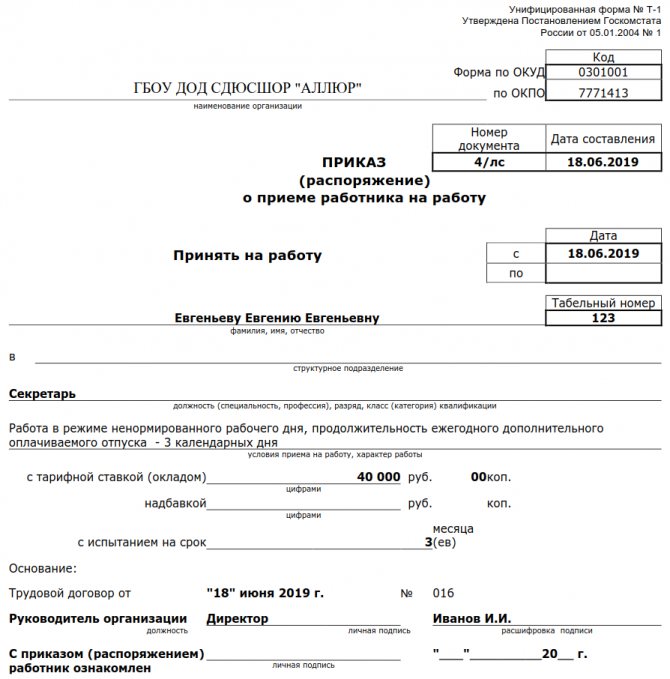
Correct execution of the employment contract is a guarantee that in the future the manager will not need to obtain consent from the subordinate for every extracurricular activity.
Employees whose work schedule is documented to be irregular have the right to additional annual paid leave. Its minimum duration is determined by the Labor Code of the Russian Federation and is 3 days.
Let's figure out how this type of leave is assigned and paid.
Legislation
The main document regulating labor relations is the Labor Code. However, the list of employees with irregular working hours is determined solely by the employer. This list is documented and further enshrined in local regulations.
For employees of government agencies, the procedure for establishing an irregular schedule, as well as the provision of additional leaves in connection with this, are determined at the legislative level. But the list of persons to whom these provisions apply is compiled by the employer.
- all types of enterprises - internal regulations of the organization;
- state institutions at the federal level - Government resolution;
- government institutions at the level of a constituent entity of the Russian Federation - regulatory acts of a specific subject;
- municipal institutions - regulations at the municipal level.
According to the latest changes, Rostrud obliged managers to indicate in the employment contract the fact of an irregular work schedule, although previously it was enough to reflect this point in the internal act of the organization.
Many organizations today actively use irregular schedules. Its advantages for the employer are obvious:
- no need for a documentary explanation for exceeding the maximum working day standards;
- no need to obtain written consent from the employee;
- the employee’s inability to refuse overtime work.
When establishing an irregular work schedule in an organization, the employer must comply with certain conditions: register a list of positions whose work schedule exceeds the maximum permissible limits in internal instructions and a collective labor agreement, and also establish for these employees, along with the main paid leave, an additional one - lasting at least three days.
For this, the employee is not entitled to monetary compensation, but several days of additional leave. They are provided regardless of the amount of additional work performed, even when the employee has never been involved in additional work during the billing period.
We invite you to familiarize yourself with: Rules for calculating transport tax
Irregular work schedules are sporadic in nature, that is, regularly engaging subordinates to work overtime is illegal, since it violates his labor rights. It is worth noting that additional work must be part of the employee’s job responsibilities and contained in his employment contract.
The Labor Code obliges employers to provide their subordinates with irregular work schedules with additional leave. He also determines its minimum duration, equal to three days.
The duration of such leave for various positions is regulated by the internal regulations of budgetary organizations based on the amount of additional work, the degree of workload and other conditions.
In addition to the Labor Code, the following regulations must be taken into account:
- Order of the Ministry of Finance No. 54, which determines the duration of additional leave for employees of the central office of the Ministry of Finance - from 8 to 12 days;
- Order of Rosarkhiv No. 138 IS for archival service workers: from 8 to 14 days;
- Order of the Ministry of Justice No. 33, etc.
Heads of commercial organizations can provide subordinates with additional leave of more than 14 days.
For them, only its minimum duration is regulated - 3 days. As a rule, HR employees are guided by the actual time an employee works in excess of the normal schedule: the more he works additionally, the longer the vacation will be.
How is it paid?
Additional leave is paid in the same way as the main leave. To calculate the amount of vacation pay, it is necessary to determine the employee’s average daily wage and multiply it by the number of vacation days.
At the request of the employee, the employer has the right to replace the provision of additional holidays with financial compensation. However, such a possibility is not recorded in the Labor Code, so the manager can refuse monetary compensation and send the employee on leave.
Registration procedure
Registration of additional leave for irregular working hours is essentially no different from registration of regular paid leave. Detailed instructions for applying for additional leave are available here.
The Labor Code establishes the rights of an employee to be granted annual leave, both basic and additional.
An employer cannot refuse an employee additional leave. Before the start of the calendar year, a vacation schedule is drawn up, in accordance with which they are provided to all employees.
The Labor Code provides for the only reason why an employer can reschedule an employee’s vacation—this is production necessity, that is, the possibility of a specific employee’s vacation negatively impacting the activities of the entire organization. However, even in this case, the employee’s written consent is required.
Therefore, every employee has the legal right to go on vacation in accordance with the vacation schedule. Canceling or postponing an employee’s vacation without his consent is illegal!
Failure to provide an employee with additional leave threatens the employer with administrative liability in the form of a fine of up to 5,000 rubles for individuals and 50,000 for legal entities.
Repeated violation leads to disqualification of the organization for a period of 3 months to 3 years.
Pernicious violators who deprive employees of additional leave for two or more years may be subject to criminal liability.
The legislation of the Russian Federation allows the establishment of irregular schedules at enterprises. But the employer must comply with the regulatory requirements for such measures and respect the rights and legitimate interests of its employees. The Labor Code of the Russian Federation provides for the provision of additional leave for irregular working hours.
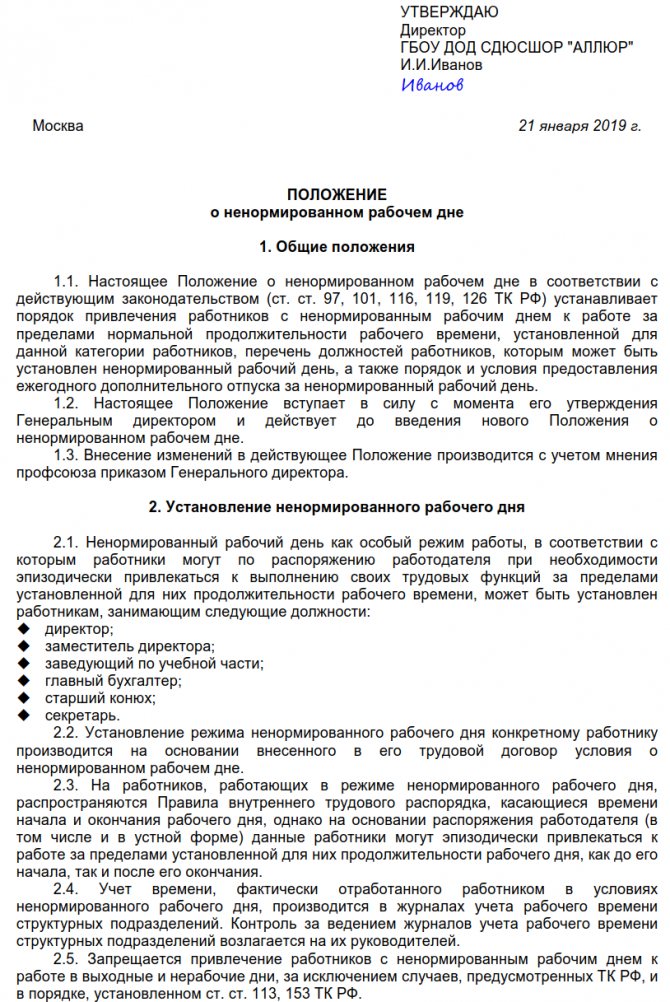
Each organization independently establishes the procedure for carrying out labor activities. But this can only be done within the framework of current legislation.
The local regulations of the company must indicate the standard working hours in the form of:
- The number and order of alternating working days and weekends.
- Length of working day.
- Duration and number of breaks per day.
The specifics of the enterprise's activities may imply the need to work beyond the established schedule. In such cases, the employer is obliged to draw up documentation and compensate for overtime hours or transfer the person to an irregular schedule.
The legislation limits the right of an employer to involve workers in overtime work exceeding 120 hours per year. But such a schedule removes this limit.
For the management of the enterprise, this mode is beneficial for the following reasons:
- Allows you to involve a person in additional work.
- Extra hours do not affect the salary level.
- To call for additional work, consent and documentation are not required.
Part-time job
There is no law prohibiting part-time workers from using irregular working hours. However, in practice, its establishment is possible only when the part-time worker is free from performing work functions on some days, since in another case a part-time working day has been introduced for him.
The latest changes regarding irregular working hours were made to Art. 101 of the Labor Code of the Russian Federation in 2021. Then the legislator introduced a new rule according to which employees working on a part-time basis can establish an irregular working day only if the following conditions are met:
- a part-time working week is established by agreement of the parties;
- this part-time work week is established with a full-time work day.
Thus, at the moment, an irregular working day, according to Art. 101 of the Labor Code of the Russian Federation in the latest edition cannot be established for part-time workers, unless it is a part-time working week.
How many extra hours are allowed?
According to Art. 91 of the Labor Code, the normal length of the working week is 40 hours, usually a five-day week with an 8-hour working day.
But in some cases, if necessary, the employer can change the work schedule and involve an employee:
- to overtime work
- irregular day
And if the Labor Code specifies clear restrictions on the duration of overtime work, then there are no such specific instructions for irregular days.
There are only requirements that involvement in NSD:
- should not be a constant, but only an episodic phenomenon
- must be caused by extreme necessity
- does not apply to weekends and holidays
- does not apply to persons working part-time
ATTENTION! Obtaining the consent of a subordinate to perform work duties after completion of working hours is not required.
Long working hours in 2021: changes, latest news
The State Duma of the Russian Federation intends to consider a bill on changing the rules for regulating irregular working hours. Changes are planned to be made to Art. 101 and 119 of the Labor Code of the Russian Federation. The bill was submitted to the State Duma of the Russian Federation back in 2021; a new date for its consideration was set in February 2021 after almost two years of consideration in the State Duma Council.
In the explanatory note, the initiators of the amendments claim that the draft serves the purpose of eliminating the unreasonable use of irregular working hours. It is assumed that such a regime will be applied only after it is enshrined in a local regulatory act: a collective agreement. According to the draft, it is prohibited to introduce such a working day for pregnant women, minors, citizens experiencing health problems, as well as to exceed the maximum number of additional working hours per year (no more than 120).
Those who work more hours than normal will be paid in accordance with overtime regulations. Moreover, these prohibitions cannot be violated even with the employee’s consent. For work beyond the norm, additional paid leave will be granted, lasting from 7 to 15 days. If these amendments are made to the Labor Code of the Russian Federation, the practice of using irregular working hours may change significantly.
Irregular working hours with part-time work
We adhere to the first point of view, since no one has canceled the time sheet. And recording the time spent at work will help the employer track the frequency of going beyond the working day. In addition, time tracking will be useful in the event of any emergency - it will be possible to say for sure whether the employee was at work or not.
Article 101 of the Labor Code of the Russian Federation gives the concept of in which case, with part-time work, an irregular working day can be established. For an employee working on a part-time basis, an irregular working day can be established only if the agreement of the parties to the employment contract establishes a part-time working week, but with a full work shift.
These changes for irregular working hours were made to the Labor Code back in 2021.
Reflection of conditions in the employment contract
The condition for changes in the routine is reflected either in the employment contract or in an annex to it without fail. If the contract already stipulates one condition, attraction to another is unacceptable.
Sample employment contract with irregular working hours.
